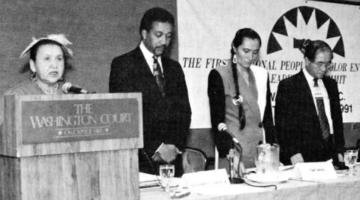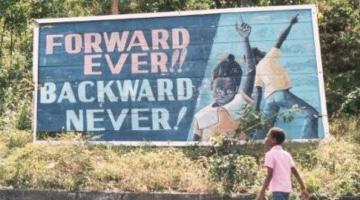The white power movement drew recruits, many of them women, from every region of the country and all socio-economic sectors of white America.
“This book shows how effective this movement was at disguising what it was trying to do.”
In this series, we ask acclaimed authors to answer five questions about their book. This week’s featured author is Kathleen Belew. Belew is Assistant Professor of History at the University of Chicago. Her book is Bring the War Home: The White Power Movement and Paramilitary America.
Roberto Sirvent:How can your book help BAR readers understand the current political and social climate?
Kathleen Belew: Bring the War Home is an example of what history can teach us about the present moment, and how we can better respond to organized racist activism. It’s the story of the white power movement, a groundswell that united neo-Nazis, Klansmen, skinheads, radical tax resistors and more in an overt guerrilla war on the federal government. It examines the period between the Vietnam War and the 1995 Oklahoma City bombing, but the book shows, fundamentally, how effective this movement was at disguising what it was trying to do. In the aftermath of the confrontations in Charlottesville last August (2017), the tone of public response to the presence of such activism in the present moment has overwhelmingly been one of shock and astonishment. But actually, what seems new is not new: white power activists pioneered many of today’s strategies in the 1979-1995 period. Although the events I write about in Bring the War Homewere all known at the time, covered in major newspapers, on television, and even on Saturday Night Live, the public never came to understood them as part of an organized social movement. With this historical context in hand, my hope is that people can better respond to similar organizing in the present moment.
What do you hope activists and community organizers will take away from reading your book?
Starting in 1983, the white power movement used a strategy called Leaderless Resistance, which we would now understand as cell-style terrorism. The idea was to foil infiltrators and to make prosecution difficult. But Leaderless Resistance had another, perhaps more important effect: it stymied public understanding of white power activism as connected, ideologically driven, and as part of a social movement. The strategy, therefore, achieved its goals in making prosecution difficult, but to counteract its legacy would involve a much broader transformation of understanding. It would involve projects of public knowledge, and efforts to connect acts of violence rather than seeing them as the work of madmen or lone wolves. It would involve a serious attempt to understand the ideology motivating these activists. I think this could have implications for juror education, investigative strategy, journalism, and public policy.
“The aftermath of warfare has corresponded quite consistently with surges in Klan activity through the life of that group.”
The other major takeaway is the importance of the aftermath of war in accounting for resurgences of white power activism. In the period of my study, the Vietnam War worked to united activists who had previously disagreed. It provided the uniforms, weapons, and tactics adopted by the movement. It also provided a narrative frame through which these activists made sense of their actions. Now, this isn’t the only factor involved, and such activists were also responding to the social movements of previous decades, demographic change, feminism, and more. But the aftermath of warfare has corresponded quite consistently with surges in Klan activity through the life of that group. This directs our attention to the ways in which war comes home.
We know readers will learn a lot from your book, but what do you hope readers will un-learn? In other words, is there a particular ideology you’re hoping to dismantle?
There are a lot of misconceptions about white power activism, perhaps none more insidious than the false perception that its actors belonged to one regional or class background. They’re often portrayed as uneducated, rural Southerners. Instead, this was a social movement that stretched across every region of the United States. Its members came from cities, suburbs, and rural areas. Some were high school dropouts, but others held advanced degrees. Some were felons, but others were religious leaders, mothers, active-duty service members, veterans, and others who had social credibility. Many of them were women, and indeed women did critical work in brokering and sustaining the social relationships that bound the movement together. Indeed, marriages, counseling relationships, shared childcare, and women’s auxiliary groups were as important to this period of white power activity as cross-burnings, public rallies, and paramilitary camps.
Who are the intellectual heroes that inspire your work?
You know, I could give you the usual suspects in the field of history, and there are a great many of them, but the first people that come to mind for this project are those who were attempting to tell this story as it happened. The advantage of the historian is the distance of remove that also affords a massive archive of ephemera, surveillance files, newspaper articles, court records, and more. I got to see people’s actions as well as their rhetoric, and to trace people’s lives over a span of two decades. But many people started attempting to tell this story without the luxuries of remove and archival depth. I think about the reporters like Nicholas Chriss, who worked for the Houston Chronicle, became a beat reporter on Klan paramilitary camps in Galveston Bay, and ended up covering the 1987-88 Fort Smith trial. He sounded the alarm, had a remarkably good view of one sphere of the movement, and had much less to go on than I’ve had. You could say the same for some of the early ethnographies. Certainly I’m indebted to historians of the earlier Klan. There are also a number of intrepid archivists without whom a book like this wouldn’t have been possible.
In what way does your book help us imagine new worlds?
At the end of the day, the work of understanding violent perpetrators is a task of locating humanity. Understanding white power activists not as madmen or lone wolves but as part of a social movement lets us see them as human, lets us see the larger and systemic movements of American history that grieve them, and creates space for us imagine alternatives.
Roberto Sirvent is Professor of Political and Social Ethics at Hope International University in Fullerton, CA. He also serves as the Outreach and Mentoring Coordinator for the Political Theology Network. He’s currently writing a book with fellow BAR contributor Danny Haiphong called American Exceptionalism and American Innocence: A People’s History of Fake News—From the Revolutionary War to the War on Terror.
COMMENTS?
Please join the conversation on Black Agenda Report's Facebook page at http://facebook.com/blackagendareport
Or, you can comment by emailing us at comments@blackagendareport.com



















